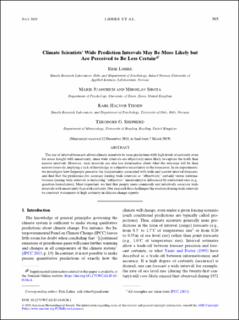Climate scientists' wide prediction intervals may be more likely but are perceived to be less certain
Peer reviewed, Journal article
Published version
Permanent lenke
https://hdl.handle.net/11250/2686405Utgivelsesdato
2019Metadata
Vis full innførselSamlinger
Sammendrag
The use of interval forecasts allows climate scientists to issue predictions with high levels of certainty even for areas fraught with uncertainty, since wide intervals are objectively more likely to capture the truth than narrow intervals. However, wide intervals are also less informative about what the outcome will be than narrow intervals, implying a lack of knowledge or subjective uncertainty in the forecaster. In six experiments, we investigate how laypeople perceive the (un)certainty associated with wide and narrow interval forecasts, and find that the preference for accuracy (seeing wide intervals as ‘‘objectively’’ certain) versus informativeness (seeing wide intervals as indicating ‘‘subjective’’ uncertainty) is influenced by contextual cues (e.g., question formulation). Most important, we find that people more commonly and intuitively associate wide intervals with uncertainty than with certainty. Our research thus challenges the wisdom of using wide intervals to construct statements of high certainty in climate change reports.
Beskrivelse
© 2019 American Meteorological Society
